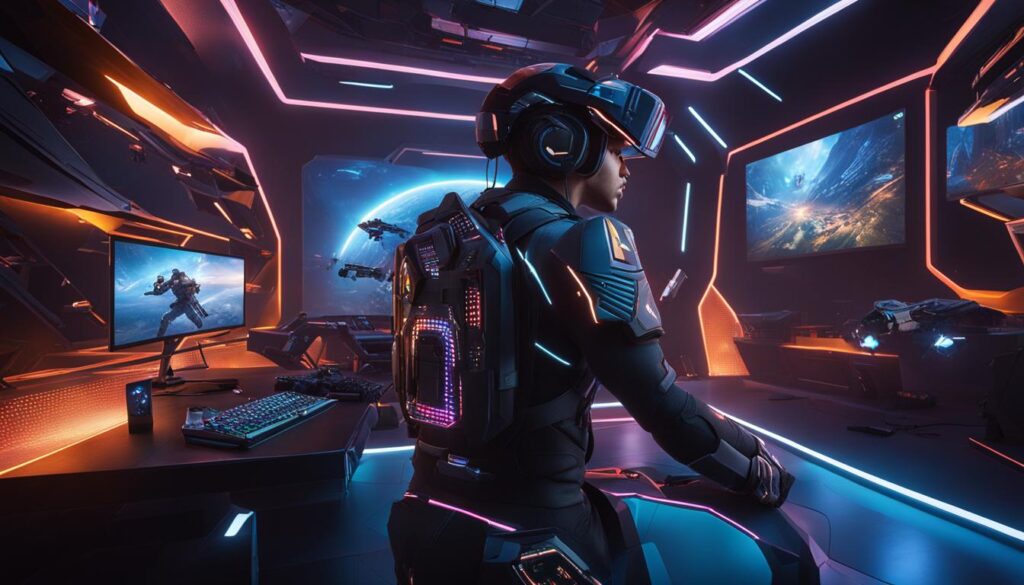Welcome to the fascinating world of AI Video Games, where Artificial Intelligence Gaming is taking the player experience to new heights by revolutionizing Video Game AI and Gaming Technology.
From character-driven titles like Detroit: Become Human to innovative AI implementations in franchises such as Halo, it’s evident that AI is propelling the gaming industry to innovate, adapt, and respond to player actions like never before. So, what magic does AI bring to our loved video game plots and immersive gaming environments? Let’s dive in and uncover how this cutting-edge technology is shaping the future of gaming!
Understanding AI in Video Games
AI in gaming combines sophisticated video game algorithms and machine learning to create immersive virtual experiences. It breathes life into NPCs, making them respond and interact authentically with human players. The integration of AI not only enhances the gaming adventure but also consistently challenges players with adaptive difficulty levels, cultivating an engrossing and unpredictable environment.
By integrating AI, video games can tap into innovations such as dynamic content generation, realistic character traits, real-time strategy adjustments, and even mining user data to improve engagement and discover monetization opportunities. The key to creating this immersive gameplay lies in the perfect blend of AI integration, NPC intelligence, and advanced algorithms.
AI in gaming bridges the gap between reality and the virtual world, allowing for unprecedented levels of interaction and responsiveness from in-game characters and environments.
Developers are increasingly harnessing the power of AI to create captivating gameplay experiences, where every NPC behaves and reacts like a real-life entity. The advanced use of AI algorithms allows NPCs to learn from past encounters, continually adapting and refining their reactions to the players’ choices throughout the game.
- Procedural content generation for dynamically created landscapes and levels
- Real-time strategy adjustments to respond to player actions and decisions
- Mining user data to tailor gameplay and boost in-game engagement
As AI technology continues to evolve, so too does its potential to revolutionize the gaming industry. From creating dynamic, ever-changing game worlds to incorporating realistic NPC behaviors, AI is poised to continuously enhance and shape the future of gaming experiences.
The Evolution and Impact of AI on Gaming
The incorporation of AI into gaming heralds a revolutionary shift in how games operate, bringing about adaptive gameplay and realistic non-player characteristics. This AI gaming evolution delivers a transformative gaming experience, with each player’s journey uniquely responsive to their actions. Interactive gaming environments evolve with AI innovation, ensuring immersive, engaging entertainment.
Key advances in AI technology open up avenues for future innovations, such as machine learning and deep learning. Games have evolved to include AI that balances multiplayer settings, performs rigorous testing, and tailors difficulty based on player abilities. AI’s growing presence provides cost-saving efficiencies like procedural content generation and the potential to revolutionize gaming further.
AI has the capacity to transform game worlds, enhancing the overall impact of gaming on the entertainment landscape.
Notable examples of AI in gaming include titles like “The Last of Us” and “Middle-Earth: Shadow of Mordor,” where AI-controlled non-player characters (NPCs) dynamically adapt their strategies and behaviors in response to player interactions. These games offer players a sense of realism and engagement that was once unachievable in the gaming industry.
With AI driving continuous improvements in the gaming experience, players can anticipate even more groundbreaking developments in the years to come. As the AI gaming evolution continues to unfold, the future of gaming promises to be more interactive, immersive, and exciting than ever before.
AI in Gameplay: Creating More Adaptive Experiences
Artificial intelligence elevates gaming experiences by introducing adaptive gameplay, challenging game AI, and dynamic non-player character (NPC) behavior. These aspects work in tandem to create an evocative and immersive gaming environment unlike ever before. The discussion below further explores the distinct aspects of AI in modern gaming.
Adaptive Difficulty for Enhanced Challenge
One of the key contributions of AI to gaming is the creation of adaptive difficulty levels that tailor challenges based on a player’s skills and actions. Adaptive gameplay prevents monotony by constantly generating fresh, engaging encounters tailored to individual aptitudes. This is achieved through systems such as Dynamic Difficulty Adjustment in FIFA, where the game constantly evaluates player performance and adjusts difficulty levels in real-time.
Dynamic Non-Player Character Behaviors
NPC behavior undergoes a significant transformation with AI integration, making it more intricate and lifelike. Systems like FIFA’s Player Personality System enable NPCs to make decisions, react to events, and adjust their strategies intelligently, as they would in the real world. This results in a living and dynamic gaming environment that contributes to a highly immersive experience.
Real-Time Strategy and Tactical Adjustments
Beyond enhancing NPC behavior, AI facilitates real-time strategy and tactical adjustments during gameplay to increase competitiveness and complexity. Tactical AI guarantees that both player and NPCs utilize intelligent strategies to outmaneuver their opponents, making each gaming encounter unique and engrossing. In essence, AI-implemented tactics form a critical component of modern, immersive games that adapt to player actions.
Character and Story Development Driven by AI
Video games are now benefiting from AI-driven storylines and character development that create intricate, personalized narratives and character arcs. Through advancements in AI, storylines and character progression offer rich development trajectories, simulating a sense of reality akin to real-life storytelling.
Dynamic storytelling AI has opened up new possibilities for video game narratives, generating uniquely tailored stories based on players’ in-game decisions and actions. This innovative approach breathes life into characters, encouraging deeper emotional connections to virtual worlds and engrossing players in an immersive and memorable gaming experience.
Career modes in games like “FIFA Manager” utilize AI-powered scouting mechanisms to generate virtual players with distinctive abilities and potential. As players advance in their gaming careers, these characters develop in tandem, evolving to create more engaging gameplay and highly dynamic sports simulations.
AI has ushered in an era of autonomic character behaviors and story arcs that respond realistically to player decisions and actions, elevating the storytelling aspects to new heights.
Video game developers are increasingly leveraging AI to produce better narratives and more authentic character portrayals. This approach not only enhances the gaming experience but also holds the potential to change the way we view interactive storytelling as a whole.
- AI-Driven Storylines create personalized experiences based on player choices
- Character Development in Games evolves as players progress through the story
- Dynamic Storytelling AI continuously adapts virtual worlds to player actions
In conclusion, AI has become an essential component in video game storytelling and character development, providing gamers with tailored, immersive experiences. Its impact on the industry resonates deeply, promising a future filled with innovative and captivating narratives for all to enjoy.
Behind the Scenes: AI in Game Design and Testing
While AI is known for enhancing player experiences in the gaming world, it also plays a significant role in the development and testing processes. As a powerful tool, AI aids in automating content generation, debugging, and even facilitating the creation of innovative concept art. With its capabilities, AI reduces manual tasks and speeds up the process of game design — providing the foundation for limitless gameplay scenarios.
Procedural Content Generation and Infinite Gameplay
One of the primary benefits of incorporating Game Design AI is its ability to streamline the process of content generation. Through Procedural Generation, AI algorithms automatically create expansive game worlds, unlocking the potential for endless gameplay possibilities. This is evident in the development of iconic games like World of Warcraft and Overwatch, where Blizzard uses generative AI to craft detailed and diverse gaming environments.
Automating Game Testing and Debugging
AI Debugging Techniques are a game-changer for developers, facilitating a faster and more efficient testing process. AI-driven test simulations can uncover bugs and performance issues promptly, saving both time and resources. By automating and optimizing the debugging phase, AI enables designers to focus on refining gameplay mechanics, ultimately elevating the overall gaming experience.
AI-Assisted Creative Concept Design
Concept Art AI brings an exciting dimension to game development, fostering creativity and enhancing the visual appeal of gaming environments. By employing AI algorithms, artists and programmers can automate repetitive tasks while dedicating their expertise to the creative aspects of game design. Tools like Blizzard Diffusion showcase AI’s influence in generating innovative and captivating game concepts, ultimately setting the stage for cutting-edge gaming experiences.
Revolutionizing Sports Games with Advanced AI

The world of sports games has been revolutionized by the integration of Advanced Gameplay AI and Intelligent Gaming technologies. This has led to an unparalleled level of realism and engagement for players, providing a truly immersive experience. The complex nature of real-world sports is now mirrored in video games, thanks to advanced AI Algorithms Sports.
One of the most prominent examples of this transformation is the FIFA franchise, which utilizes machine learning to craft adaptive and intelligent gameplay. The game constantly evolves and adapts to the player’s skill level, providing a unique and captivating gaming experience.
“The introduction of technologies such as the Dynamic Difficulty Adjustment and Player Personality System showcases AI’s impact on gaming by creating unique experiences tailored to players’ skills and behaviors.”
These innovative technologies transform sports games into highly immersive and intelligent simulations, providing players with the thrill of competing in a virtual world that closely mirrors real-life sports. Additionally, the AI-powered algorithms constantly learn from players’ interactions and decisions, allowing for more accurate and realistic simulations of in-game challenges and competitions.
- Dynamic Difficulty Adjustment: This cutting-edge technology assesses players’ performance and adjusts the game’s difficulty levels in real-time, ensuring that the experience remains consistently challenging and engaging.
- Player Personality System: AI-powered scouting mechanisms in FIFA’s “Manager Mode” generate virtual players with distinctive abilities and potential. This allows for the evolution of players’ gaming careers as they advance through the ranks, enhancing the overall game experience.
In conclusion, the application of advanced AI in sports games has revolutionized the gaming industry, providing players with an incredibly immersive and realistic experience. As AI technology continues to advance, sports games will only become even more engaging and lifelike, further blurring the lines between virtual and real-world sports.
How AI Powers Your Favorite Video Games
Artificial intelligence (AI) has become an essential component in today’s most popular video games, significantly impacting the gaming experience. One noteworthy example is the FIFA series, which utilizes AI technologies to create realistic sports simulations and adapt gameplay based on player interactions. With the help of intelligent opponents, these innovations contribute to an immersive and constantly evolving AI gaming experience for players worldwide.
FIFA’s AI Innovations for Realistic Sports Simulation
In the FIFA franchise, several AI-driven innovations have been introduced to enhance the level of realism in sports simulation. Among such advancements is the “Dynamic Difficulty Adjustment” system, which continuously evaluates a player’s performance and modifies the game’s challenge in real-time. This ensures that the gaming experience remains engaging and tailored to the individual’s skill level. Additionally, FIFA has implemented the “Player Personality System,” granting non-player characters (NPCs) unique attributes and behaviors that reflect their real-life counterparts, further contributing to the game’s authenticity and immersiveness.
Artificial Opponents That Learn and Adapt
Beyond creating a realistic gaming environment, AI in video games like FIFA also involves designing artificial opponents that can learn, adapt, and evolve with each match. These learning AI opponents analyze player strategies and interactions, adjusting their tactics accordingly to make the game more challenging and engaging. Ultimately, the continuous improvement of AI-controlled characters leads to a more dynamic and personalized gaming experience, as players are constantly faced with new challenges and more competitive virtual opponents.
In conclusion, AI plays a crucial role in elevating the gaming experience of beloved video games such as FIFA. Through the integration of innovative systems like Dynamic Difficulty Adjustment and Player Personality System, AI technologies have significantly impacted the gaming landscape, setting the stage for even more exciting advancements to come. By providing players with increasingly intelligent and adaptive opponents, AI continues to redefine the frontiers of realism and immersion in the world of video games.
AI’s Role in Level Design and Environmental Interaction
Artificial Intelligence (AI) has significantly impacted the gaming landscape, especially in the realm of AI Level Design and Environmental AI. One of AI’s biggest contributions to gaming is the creation of Adaptive Gaming Environments, where game worlds evolve and adapt based on player behavior. This dynamic nature of AI-powered level design keeps the gaming experience engaging and prevents repetition, providing endless possibilities for exploration and interaction.
AI is responsible for crafting detailed and immersive in-game ecosystems that react to player choices in real-time, amplifying the authenticity and level of engagement within virtual worlds. This includes everything from responsive flora and fauna to intelligent adversaries and allies that can adjust their tactics accordingly based on the player’s actions and experience.
One notable example of AI’s role in environmental interaction can be seen in the development of open-world games, where every element responds and adapts to the player’s actions, choices, and playstyle. With AI-powered level design and environmental interactions, players can truly influence and shape their gaming experience, creating unique and personalized adventures.
AI Level Design and Environmental AI are transformative forces in the gaming industry, breathing life into virtual worlds and fostering intricate and adaptive gameplay experiences.
As AI continues to advance and develop, we can expect even more sophisticated and responsive game worlds that further enhance immersion and realism for an ever-growing gaming audience. Overall, AI will undoubtedly redefine the way games are made and played, broadening the scope for personalized and engaging experiences unmatched by conventional gaming environments.
AI and the Future of Immersive Virtual Reality Gaming
As technology continues to evolve, artificial intelligence (AI) is becoming a driving force in the realm of virtual and augmented reality gaming experiences. Thanks to innovations in AI, players can become fully immersed in hyper-realistic simulations that merge the physical and virtual worlds. The future of immersive VR gaming and AI-driven AR experiences promises groundbreaking advancements through mixed reality and next-gen AI solutions.

Enhancing Realism through AI-Driven VR/AR Experiences
AI algorithms are enhancing the realism of virtual reality (VR) and augmented reality (AR) gaming experiences by making environments more responsive and intuitive, closely mirroring real-world scenarios. In these AI-driven VR and AR landscapes, players can experience gaming simulations that are adaptive and seamless, merging virtual elements with surrounding environments to create a truly engaging experience.
Merging Physical and Virtual Worlds with Mixed Reality AI
Mixed reality technologies are driving the fusion of physical and virtual environments, enabled by advanced AI algorithms. Through these developments, AI continues to break down barriers in the gaming landscape, producing immersive experiences that blend reality with virtual elements. This innovative combination of mixed reality and next-gen AI elevates gaming to a captivating new dimension.
Thanks to AI’s ever-evolving role in gaming, the future promises an exciting array of immersive VR gaming and AI-driven AR experiences that can redefine the boundaries of interactive entertainment. Just as AI continues to innovate in other areas of video game development, these advancements in mixed reality encourage us to explore the potential for even more groundbreaking gaming possibilities.
Conclusion
As the landscape of AI game development continues to evolve, it is clear that artificial intelligence has become an integral part of crafting cutting-edge gaming technology. From adaptive challenges that keep players engaged to rich character and story arcs that entice players to invest further into game worlds, AI has proven itself to be a powerful force within the gaming industry.
The breakthroughs in game AI advancements have not only revolutionized game design and testing but also reshaped sports simulations, providing unparalleled realism and engagement in sports-based video games. Furthermore, the future of AI in gaming shows great promise, as it paves the way for immersive virtual reality (VR) and augmented reality (AR) experiences, allowing players to dive deeper into interactive entertainment.
Ultimately, the integration of AI in video games represents an exciting and transformative chapter in the industry’s history, with the potential for even greater innovation on the horizon. As game developers and players alike embrace the power of AI, the future of gaming will undoubtedly be more immersive, dynamic, and captivating for gamers worldwide.


